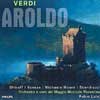Verdi Aroldo
Verdi’s recasting of Stiffelio cannot be ignored‚ especially in such a fine version
View record and artist detailsRecord and Artist Details
Composer or Director: Giuseppe Verdi
Genre:
Opera
Label: Philips
Magazine Review Date: 2/2002
Media Format: CD or Download
Media Runtime: 127
Mastering:
Stereo
DDD
Catalogue Number: 462 512-2PH2

Tracks:
| Composition | Artist Credit |
|---|---|
| Aroldo |
Giuseppe Verdi, Composer
Anthony Michaels-Moore, Egberto, Baritone Carol Vaness, Mina, Soprano Fabio Luisi, Conductor Florence Maggio Musicale Chorus Florence Maggio Musicale Orchestra Giuseppe Verdi, Composer Julian Gavin, Godvino, Tenor Marina Comparato, Elena, Soprano Neil Shicoff, Aroldo, Tenor Roberto Scandiuzzi, Briano, Bass Sergio Spina, Enrico, Tenor |
Author:
Verdi’s revisions are invariably improvements‚ but Aroldo‚ his 1857 recasting of Stiffelio‚ isn’t a simple revision. Stiffelio’s plot‚ of a protestant pastor who discovers his wife’s adultery‚ had proved unacceptable to most Italian opera houses; those that did stage it changed the tenor hero from a clergyman to a prime minister‚ much to Verdi’s disgust. His own revised plot‚ however‚ is no better: the action is moved from 19th century Austria to 13th century Kent (with an excursion to Loch Lomond in the final scene) and the troubled priest Stiffelio becomes the Saxon knight Aroldo‚ recently returned from the crusades. There is of course no longer a conflict between his marriage vows and those of his ministry; nor can he forgive his wife in public from the pulpit. Stiffelio‚ awkward but original and emotionally involving‚ has been transformed into the stiff‚ dramatically inept Aroldo.
There are musical losses too: the splendid opening scene sketching an isolated‚ pious community had to go‚ of course; so did the final tableau in which Stiffelio and the entire congregation forgive the erring wife. But it cannot be said that anyone who knows Stiffelio can ignore Aroldo. The former had three acts‚ the revision has four‚ and the dramatically ramshackle but entirely new fourth contains music of real quality: an imaginative opening pastoral scene with three separate choruses‚ an offstage choral prayer in rich fourpart counterpoint‚ and a magnificent storm (with a shipwreck on the loch). The reunion of the wife with her husband and father is portrayed in a fine trio‚ with different and expressive music for each of them; the quartetfinale is moving and beautiful. Nor is this all: Acts 2 and 3 are nearly all unrevised Stiffelio‚ but though the heroine’s original Act 2 cavatina‚ with its delicate accompaniment for four string groups‚ is understandably retained‚ a new cabaletta is introduced‚ beginning low in the voice‚ becoming steely and brilliant as she rounds on her betrayer. There is new music in Act 1 as well: a lively drinking chorus‚ an aria for Aroldo with agitated‚ guilty asides for his wife‚ and a most effective finale‚ putting material from Stiffelio to quite new uses.
The only previous recording has the advantage of Caballé‚ meltingly expressive as Mina. Vaness’s vibrant‚ spinto manner finds less pathos in her‚ more dark eloquence; she sings spiritedly but cannot float high notes as Caballé could. Shicoff seldom sings quietly (nor did Gianfranco Cechele in the earlier set) but he makes what can be made of Aroldo’s twodimensional character. The new version’s advantages are MichaelsMoore’s beautifully sung‚ sensitively acted Egberto‚ a fine realisation of one of Verdi’s tormented fathers‚ and Luisi’s conducting. His stature as a Verdian rises with each new recording‚ and he leads with a lighter‚ subtler hand than Eve Queler on Philips. Aroldo is a weaker drama than Stiffelio‚ but it contains music that no Verdian can ignore‚ and its stature is fully evident here.
Discover the world's largest classical music catalogue with Presto Music.

Gramophone Digital Club
- Digital Edition
- Digital Archive
- Reviews Database
- Full website access
From £8.75 / month
Subscribe
Gramophone Full Club
- Print Edition
- Digital Edition
- Digital Archive
- Reviews Database
- Full website access
From £11.00 / month
Subscribe
If you are a library, university or other organisation that would be interested in an institutional subscription to Gramophone please click here for further information.




